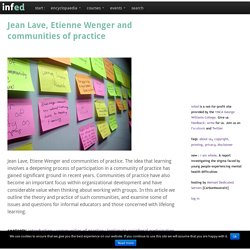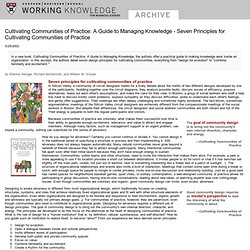

Papers/Hoadley-Kilner-SIGGROUP05.pdf. Communities of practice. Leadership groups for social learning A few years ago we started a practice of setting up leadership groups in the communities of practice that we work with.

We are sharing a document we’ve produced about this practice which you can download at the end of this post. The practice goes like this: everyone at a meeting belongs to a leadership group – and each group stewards one part of the learning process of the whole group. In this way leadership of the community meeting is distributed over the entire event. Leadership here is seen as an act of service, that is, not leadership in terms of telling others what to do, but helping the group develop itself as a learning partnership. Read more “Web 2.0″ and communities? Are the new “web 2.0″ technologies relevant? “Second Life” and communities? Do communities use tools like “Second Life” for their activities?
Media-sharing sites? What use are media-sharing sites for communities? Social networking and communities? Mind map value creation process - Wenger et al. 11-04-Wenger_Trayner_DeLaat_Value_creation. Jean Lave, Etienne Wenger and communities of practice. Contents: introduction · communities of practice · legitimate peripheral participation and situated learning · learning organizations and learning communities · conclusion · references · links · how to cite this article Many of the ways we have of talking about learning and education are based on the assumption that learning is something that individuals do.

Furthermore, we often assume that learning ‘has a beginning and an end; that it is best separated from the rest of our activities; and that it is the result of teaching’ (Wenger 1998: 3). But how would things look if we took a different track? Supposing learning is social and comes largely from of our experience of participating in daily life?
It was this thought that formed the basis of a significant rethinking of learning theory in the late 1980s and early 1990s by two researchers from very different disciplines – Jean Lave and Etienne Wenger. Intro-to-CoPs. Cultivating Communities of Practice: A Guide to Managing Knowledge - Seven Principles for Cultivating Communities of Practice. In a new book, Cultivating Communities of Practice: A Guide to Managing Knowledge, the authors offer a practical guide to making knowledge work inside an organization.

In this excerpt, the authors detail seven design principles for cultivating communities, everything from "design for evolution" to "combine familiarly and excitement. " by Etienne Wenger, Richard McDermott, and William M. Snyder Seven principles for cultivating communities of practice In Silicon Valley, a community of circuit designers meets for a lively debate about the merits of two different designs developed by one of the participants. Huddling together over the circuit diagrams, they analyze possible faults, discuss issues of efficiency, propose alternatives, tease out each other's assumptions, and make the case for their view. Because communities of practice are voluntary, what makes them successful over time is their ability to generate enough excitement, relevance, and value to attract and engage members. 1. 2. 3.